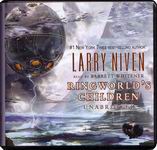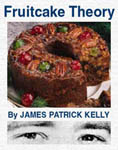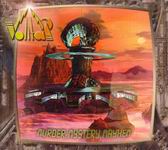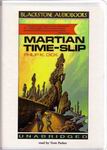
 Ringworld’s Children
Ringworld’s Children
By Larry Niven; Read by Barrett Whitener
8 CDs – Approx. 9.5 Hours [UNABRIDGED]
Publisher: Blackstone Audio
Published: 2004
ISBN: 0786185384
Themes: / Science Fiction / Hard SF / Physics / Genetics / Aliens / Nanotechnology / Evolution /
The Ringworld is a landmark engineering achievement, a flat band three million times the surface of the Earth, encircling a distant star. Home to trillions of inhabitants, not all of whom are human, and host to amazing technological wonders, the Ringworld is unique in all of the universe.
The blurb above is a bit of a lie, no longer is Ringworld unique. There is Rama, Arthur C. Clarke’s giant tube shaped alien habitat, Bob Shaw’s Orbitsville, a huge Dyson’s Sphere built by mysterious aliens and the hungry alien construct called Gaea of John Varley’s Titan. Indeed, there have also been three other books in the Ringworld series – admittedly all of them are set on the same Ringworld. But the first Ringworld novel, published in 1970, was the first of this new kind of SF novel; the novel of the big big thoughts, or as David Gerrold calls it, “the enormous big thing”. An idea, a ‘what if’ so massive and so imaginative, so rife with unforeseen consequences that the characters must investigate it just as we do. Kind of like science fiction for science fiction characters! Ringworld was such a big idea in fact, that the three sequel novels were published in an effort to examine the impossible gigantitude of the consequences of its existence. In this the fourth, and perhaps final installment of the Ringworld series, we see more of the problems of existence of such a structure fixed, visit with old characters (Louis Wu, Acolyte, The Hindmost and Tunesmith being major players) and meet some new ones too. There are some genuine surprises here, and some edge of your seat excitement, but as with the previous two sequels the biggest surprise is still the same one from the first novel – and that of course is, just how massively huge the Ringworld is! Its size still staggers the imagination… a narrow ring, only 0.997×106 miles wide, with two perimeter walls climbing 1000 miles high, to hold in the air, the ring itself is 93 million miles in radius, a single spinning world shaped like a ribbon around a star – with a habitable area of over 3 million Earths. What couldn’t happen in a place that big?
Author Larry Niven cemented himself as the standard barer of Hard Science Fiction, with the publication of Ringworld. If he had done nothing else, he’d still be thought of as a prodigious figure in the field. But he’s not rested upon his laurels; he’s expanded, refined and continued the Ringworld adventure. In a way, that was a mistake. You can’t top an idea this big by telling more adventures about the same world. On the other hand, I personally wouldn’t have had it any other way. I enjoyed nearly every minute of the nine and a half hours of listening in Ringworld’s Children. In fact, I would have been happy with another nine hours! There were a few parts that were dry, sure, but they didn’t last very long and they moved the plot along. I do wish Niven had spent some more time exploring the inhabitants of his creation; we meet only a few new hominid species, and unlike in previous installments, we don’t get a full sense of their ecological niches. But given that much of the action takes place in space around the Ringworld perhaps it couldn’t be helped. Much of this action is necessary though as many threads from the previous two sequels needed tying up, especially if this is indeed the final chapter in the Ringworld series.
Barrett Whitener, who seems to be recording nearly every Blackstone science fiction title coming out these days, was actually not a great choice as reader for Ringworld’s Children. It’s not that his reading is poor – it wasn’t. In fact, I like the way Whitener read it, I just think that his tone was all wrong for this particular novel. His various alien voices didn’t sound at all alien. Mark Sherman, who did such a terrific job with the alien voices in Larry Niven’s Protector (also recorded for Blackstone Audio) would have been a much better choice to give voice to Ringworld’s Children and its many alien characters. That said, I still enjoyed the heck out of the audiobook, and I can’t fault Whitener’s performance in the least. When the numbers and the physics are coming fast and furious it’s nice to be given the words by a good reader who can handle the text. Ringworld’s Children, all in all, is truly a worthy addition to the Ringworld novels. Long live Larry Niven!
Posted by Jesse Willis

 Fruitcake Theory
Fruitcake Theory




